National Assembly Delegate Nghe An questioned the Minister of Home Affairs about the regime for non-professional officials at commune, village and residential group levels.
(Baonghean.vn) - This is the content mentioned by delegate Thai Thi An Chung - Member of the Provincial Party Executive Committee, Deputy Head of the National Assembly Delegation of Nghe An province at the question-and-answer session on a group of issues in the field of internal affairs held on the afternoon of November 4 at the 4th session of the 15th National Assembly.
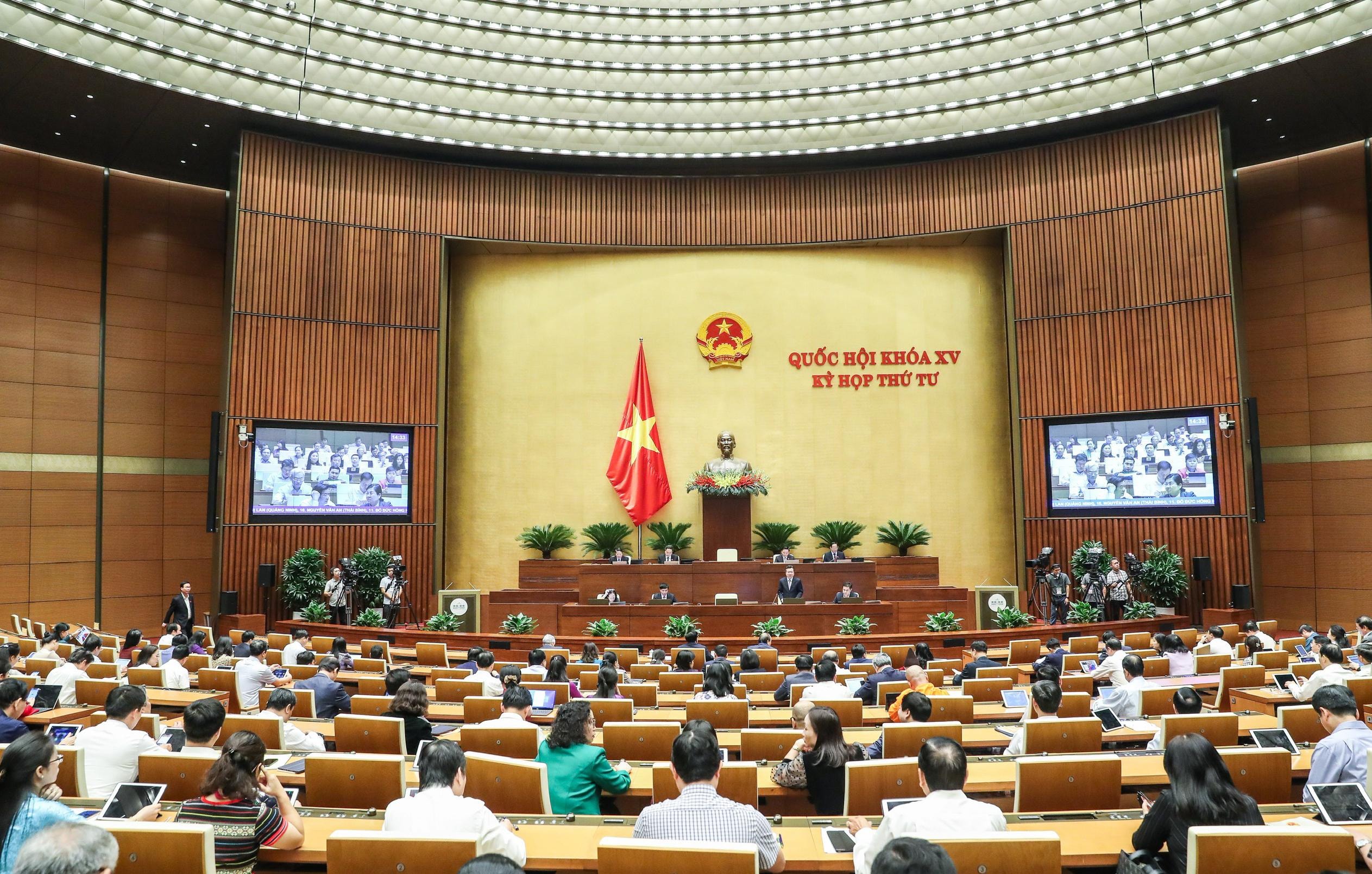 |
Panorama of the question-and-answer session on November 4 at Dien Hong Hall, National Assembly House. Photo: Quang Khanh |
Questioning Minister of Home Affairs Pham Thi Thanh Tra, delegate Thai Thi An Chung - Member of the Provincial Party Committee, Deputy Head of the Delegation of National Assembly Deputies of Nghe An province said: The merger of communes and villages in the recent past has reduced the number of units, but increased the population size and natural area. While the number of staff has decreased, the workload has increased, so it has increased the pressure on non-professional staff at the commune, village and residential group levels.
However, according to the delegate of Nghe An, the allowance regime for non-professional staff remains the same as before the merger of communes, villages and residential groups. Meanwhile, the decision on the allowance level for non-professional staff in communes and villages is under the authority of the Provincial People's Council, but the provincial level cannot increase this allowance level because Decree No. 34/2019/ND-CP of the Government amending and supplementing a number of regulations on commune-level cadres, civil servants and non-professional workers at the commune, village and residential group levels (Decree No. 34) has stipulated specific fund levels for each type of commune and village-level unit.
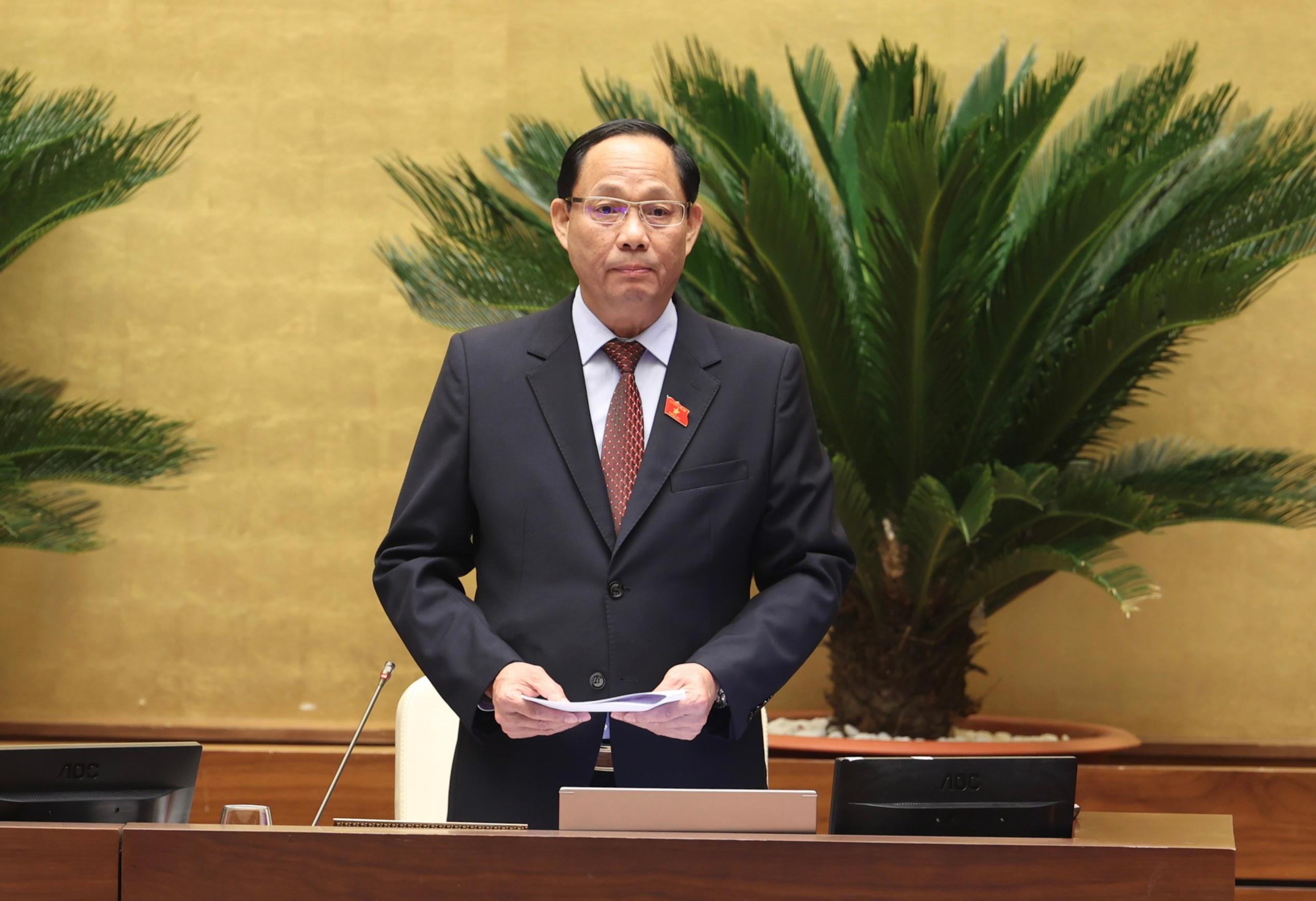 |
Senior Lieutenant General Tran Quang Phuong - Vice Chairman of the National Assembly chaired the question and answer session. Photo: Quang Khanh |
“In response to the petition of Nghe An voters in Official Dispatch No. 6538 dated December 20, 2021, the Minister of Home Affairs has noted this inadequacy to study and submit to competent authorities for consideration,” delegate Thai Thi An Chung questioned: “I request the Minister to let me know when the Government will consider amending Decree No. 34 and while waiting for the amendment of the Decree, does the Minister propose any solutions to increase allowances for non-professional cadres at the commune and village levels?”.
Responding to the opinion of the delegate from Nghe An Delegation, Minister of Home Affairs Pham Thi Thanh Tra admitted that this is a hot issue that voters are very interested in; in 2021 alone, the Ministry received about 100 petitions from voters, from National Assembly Delegations, and voters related to this issue.
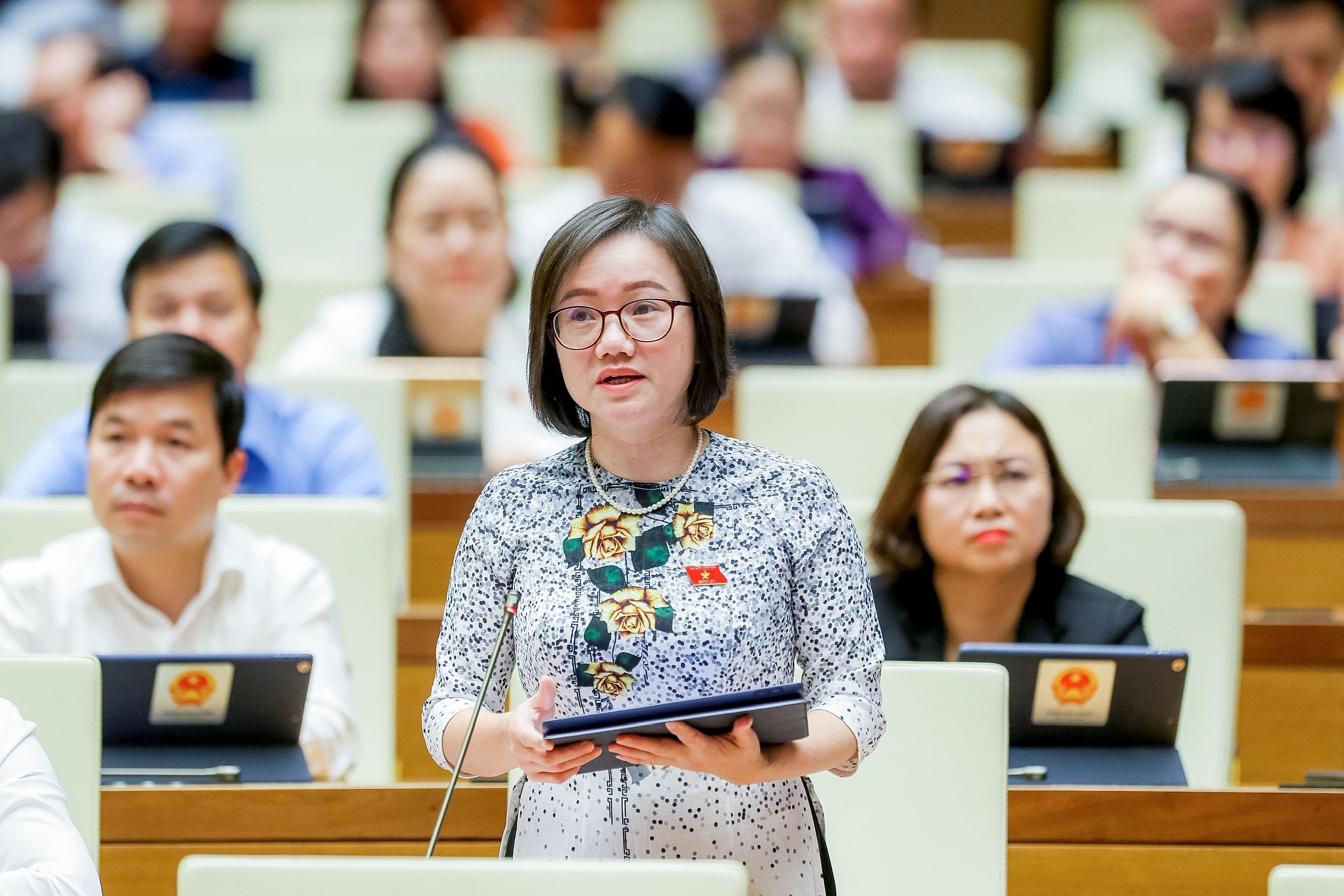 |
Delegate Thai Thi An Chung - Member of the Provincial Party Executive Committee, Deputy Head of the National Assembly Delegation of Nghe An province questioned the Minister of Home Affairs. Photo: Quang Khanh |
Going into specific content, the Minister said: Currently, our country has two civil service regimes: One civil service regime at the district level and above and one civil service regime at the commune level. However, the regime and policies for commune-level officials and civil servants do not have much change compared to those for district-level officials and civil servants and above, the only difference is in rank.
"That is, for officials and civil servants at district level and above, salaries are divided according to ranks, while for officials and civil servants at commune level, salaries are not calculated according to ranks, but are paid according to training level," said the Minister.
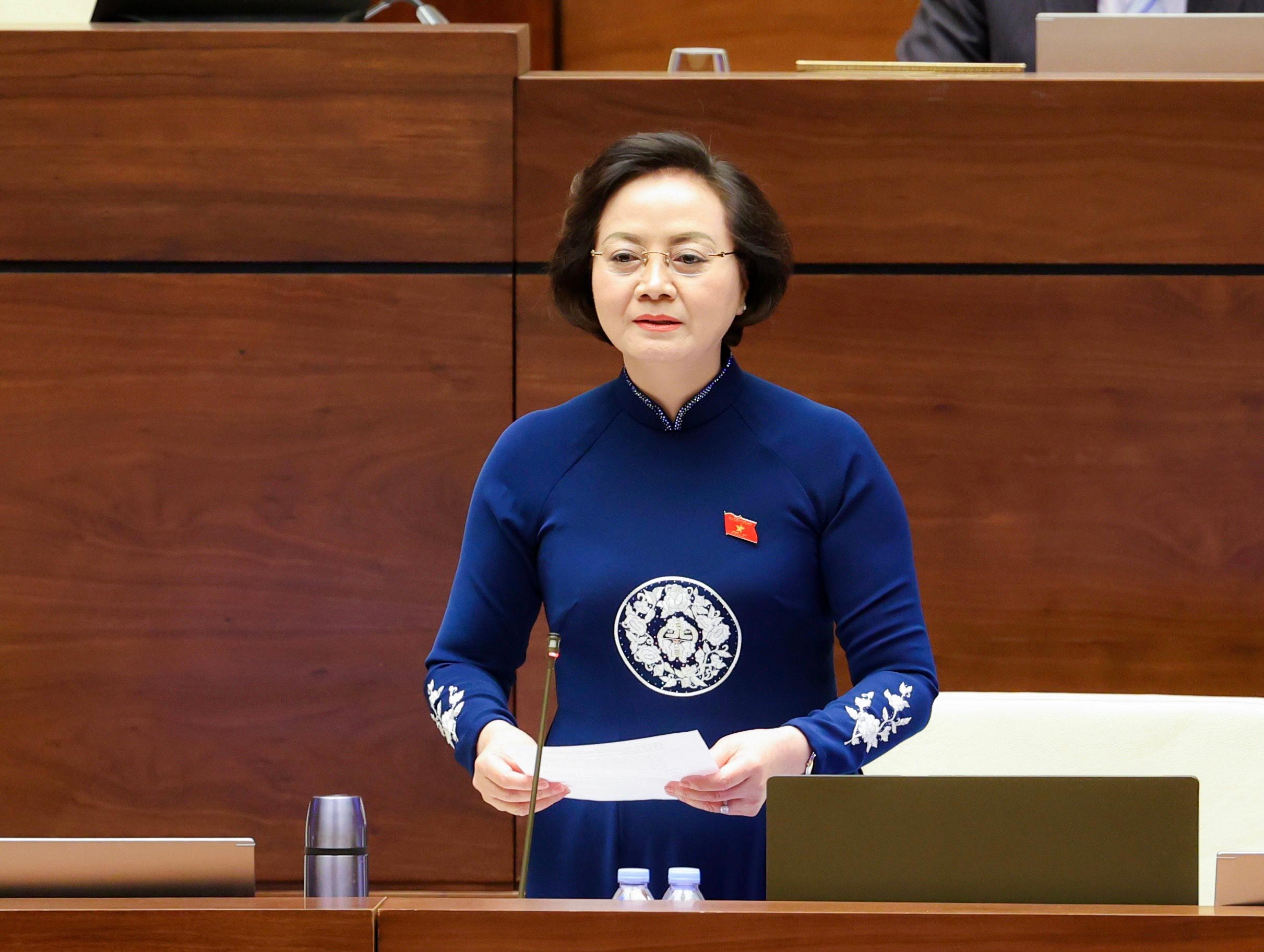 |
Minister of Home Affairs Pham Thi Thanh Tra answers questions. Photo: Quang Khanh |
The head of the Ministry of Home Affairs said that recently, in implementing the spirit of Resolution No. 18 of the Party Central Committee (12th tenure), the team of cadres and civil servants has been streamlined towards greater professionalism; later, there will be conditions to build a common civil service regime.
According to the administrative classification by commune level, the number of cadres and civil servants of type I commune is 23 people, type II is 21 people, type III is 19 people, all of which are 2 people less than Decree 92 when not amended. Accordingly, the number of non-professional cadres at the commune level also decreased, together with non-professional cadres in villages and residential groups, the total decrease is nearly 50%.
Minister Pham Thi Thanh Tra said: Currently, in our country, operating expenses are allocated to non-professional staff at the commune level and in villages and residential groups. However, in communes, there are only 8 to 9 non-professional positions; and in villages and residential groups, there are only 3 positions: Party cell secretary, residential group leader and head of the Front work committee.
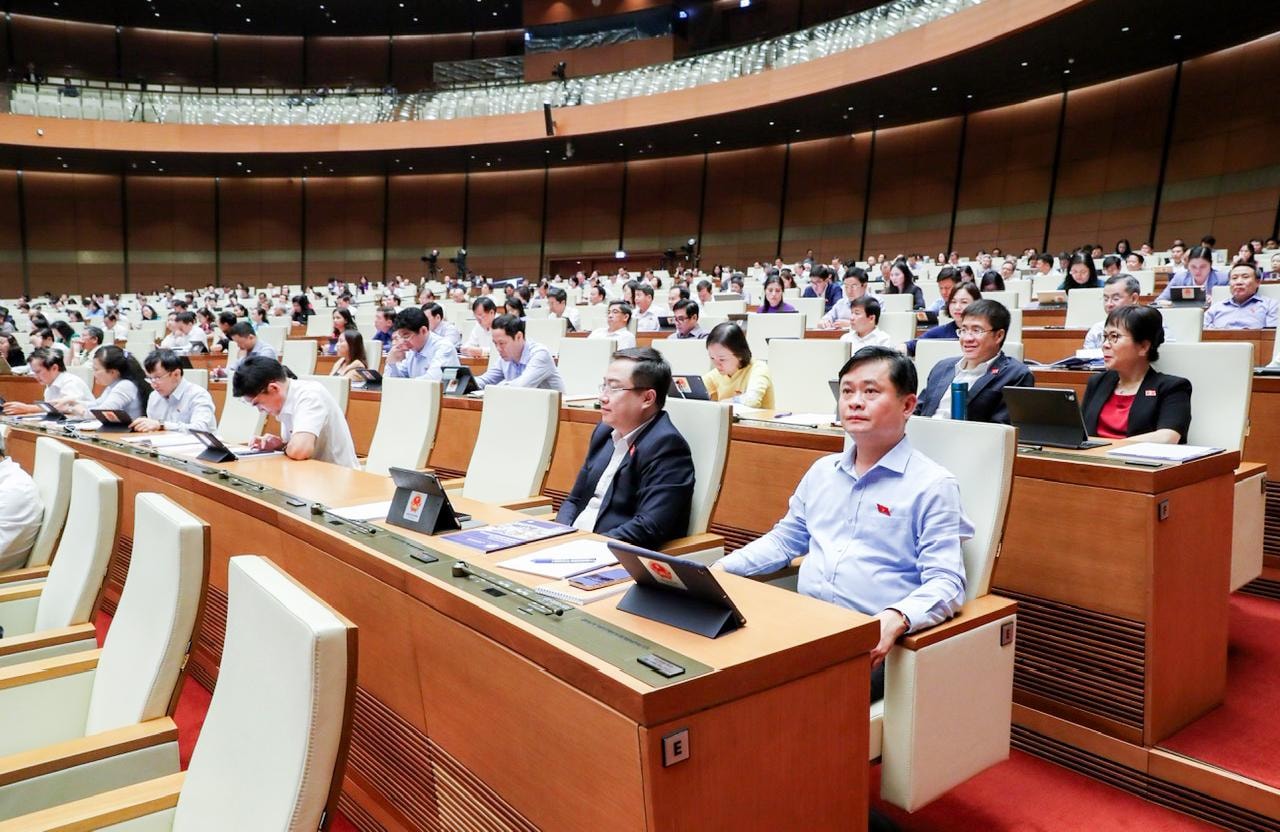 |
National Assembly Delegates of Nghe An Delegation at the question and answer session on the afternoon of November 4. Photo: Quang Khanh |
The head of the Ministry of Home Affairs admitted that the above regulations under Decree No. 34, especially the regulations on the number of non-professional staff at the commune, village and residential group levels, show inadequacies in practice. In places with large populations, non-professional staff are overloaded.
For example, in many places, the population size of commune-level administrative units is very large. For example, in Ho Chi Minh City, there are wards and communes with a population of up to 130,000 people, but in other provinces, there are communes with only about 400 people.
Recently, the Ministry has carefully researched and fully and comprehensively evaluated Decree No. 34 and found that it needs to be amended to suit reality.
"Currently, the Ministry of Home Affairs has sent the first round of consultations to 63 provinces and cities," the Minister said, emphasizing that after this National Assembly session, it will continue to research, review, and seek the Prime Minister's opinion.
The head of the Ministry of Home Affairs also informed that the direction of amending Decree No. 34 is: In addition to determining the number of cadres according to administrative units, it is necessary to calculate the population size, especially in urban or border areas and islands; at the same time, on the basis of increasing the basic salary that the National Assembly decided at this session, there will also be an adjustment to a higher contract level for non-professional cadres.
 |
National Assembly deputies at the question-and-answer session on November 4. Photo: Quang Khanh |
Along with that, the upcoming revised Decree No. 34 will also be implemented in the direction of decentralization to localities based on the total number of cadres and civil servants at the commune level, as well as non-professional cadres at the commune level and in villages and residential groups so that provinces and cities can base on local budget sources to arrange and ensure the number of employees.
“We promise the National Assembly deputies that this is a very hot issue because we have received so many recommendations from voters, so we will work as quickly as possible to report to the Prime Minister to amend Decree No. 34,” Minister Pham Thi Thanh Tra affirmed./.


